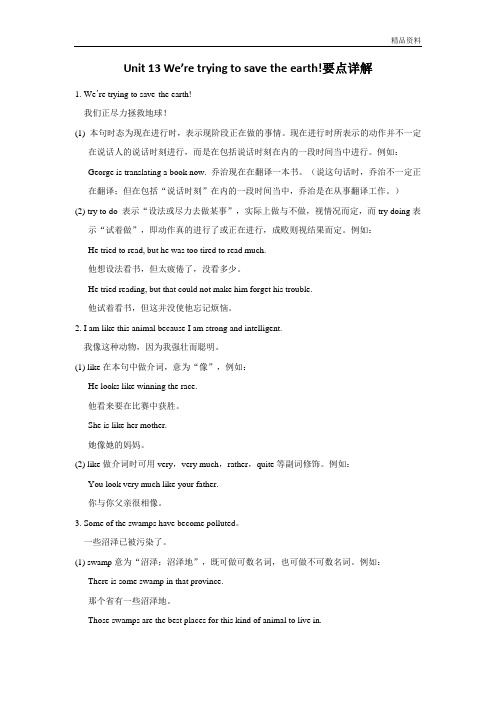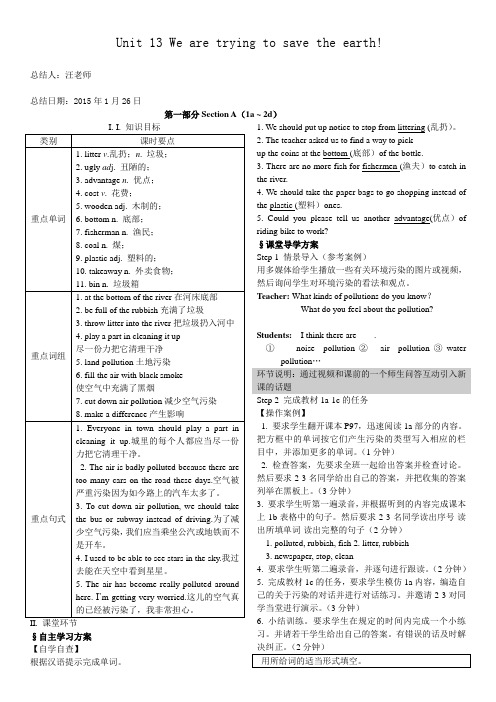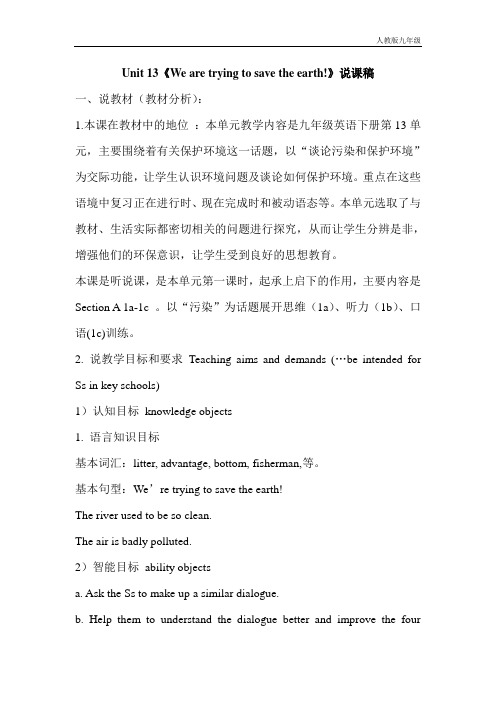unit13 We are trying to save the earth.B1
- 格式:ppt
- 大小:3.99 MB
- 文档页数:31

Unit 13 We’re trying to save the earth!要点详解1. We’re trying to save the earth!我们正尽力拯救地球!(1) 本句时态为现在进行时,表示现阶段正在做的事情。
现在进行时所表示的动作并不一定在说话人的说话时刻进行,而是在包括说话时刻在内的一段时间当中进行。
例如:George is translating a book now. 乔治现在在翻译一本书。
(说这句话时,乔治不一定正在翻译;但在包括“说话时刻”在内的一段时间当中,乔治是在从事翻译工作。
)(2) try to do 表示“设法或尽力去做某事”,实际上做与不做,视情况而定,而try doing表示“试着做”,即动作真的进行了或正在进行,成败则视结果而定。
例如:He tried to read, but he was too tired to read much.他想设法看书,但太疲倦了,没看多少。
He tried reading, but that could not make him forget his trouble.他试着看书,但这并没使他忘记烦恼。
2. I am like this animal because I am strong and intelligent.我像这种动物,因为我强壮而聪明。
(1) like在本句中做介词,意为“像”,例如:He looks like winning the race.他看来要在比赛中获胜。
She is like her mother.她像她的妈妈。
(2) like做介词时可用very,very much,rather,quite等副词修饰。
例如:You look very much like your father.你与你父亲很相像。
3. Some of the swamps have become polluted。
一些沼泽已被污染了。

Unit 13 We are trying to save the earth!总结人:汪老师总结日期:2015年1月26日第一部分Section A (1a ~ 2d )II. 课堂环节§自主学习方案【自学自查】根据汉语提示完成单词。
1. We should put up notice to stop from littering (乱扔)。
2. The teacher asked us to find a way to pick up the coins at the bottom (底部)of the bottle.3. There are no more fish for fishermen (渔夫)to catch in the river.4. We should take the paper bags to go shopping instead of the plastic (塑料)ones.5. Could you please tell us another advantage(优点)of riding bike to work? §课堂导学方案 Step 1 情景导入(参考案例) 用多媒体给学生播放一些有关环境污染的图片或视频,然后询问学生对环境污染的看法和观点。
Teacher: What kinds of pollutions do you know ? What do you feel about the pollution? Students: I think there are____. ① noise pollution ② air pollution ③water pollution … 环节说明:通过视频和课前的一个师生问答互动引入新课的话题 Step 2 完成教材1a-1c 的任务 【操作案例】 1. 要求学生翻开课本P97,迅速阅读1a 部分的内容。

Unit 13 We’re trying to save the earth(第1课时)说课稿一. 教材分析我们正在使用的教材是《PEP小学英语》,本节课是Unit 13的第一课时,主题是“We’re trying to save the earth”。
这一单元的主要内容围绕着环保意识展开,通过学习让学生们了解到保护环境的重要性,并能够运用所学知识表达对环保的看法。
教材中包含了丰富的图片、对话和活动,有助于激发学生的学习兴趣,提高他们的语言能力。
二. 学情分析本节课的对象是小学高年级的学生,他们已经具备了一定的英语基础,学习积极性较高。
学生们在日常生活中对环保有了一定的认识,但还需要通过课堂学习进一步加深理解。
此外,学生们在学习过程中注重合作和交流,教师可以充分利用这一点,互动性强的小组活动,提高教学效果。
三. 说教学目标1.知识目标:让学生掌握单词“trying, save, earth, plant, tree, pollution,clean”等,并能够熟练运用句型“We’re trying to…”表达自己的行为目的。
2.能力目标:通过课堂学习,提高学生的听说读写能力,使他们能够用英语简单讨论环保话题。
3.情感目标:培养学生关爱地球、保护环境的意识,养成良好的环保习惯。
四. 说教学重难点1.重点:单词“trying, save, earth, plant, tree, pollution, clean”的认读及运用;句型“We’re trying to…”的表达。
2.难点:对环保话题的讨论,以及如何在实际生活中践行环保。
五. 说教学方法与手段本节课采用任务型教学法,通过情境创设、小组合作、互动交流等手段,引导学生主动参与学习,提高他们的语言运用能力。
同时,运用多媒体教学手段,展示环保图片和视频,增强学生的直观感受,激发学习兴趣。
六. 说教学过程1.导入:以一首环保歌曲《We’re saving the earth》导入课堂,让学生在轻松愉快的氛围中进入学习状态。


Unit 13 We are trying to save the earth!第一课时Section A(1a ~ 2d)I. 知识目标重点单词1. litter v.乱扔;n. 垃圾;2. ugly adj. 丑陋的;3. advantage n. 优点;4. cost v. 花费;5. wooden adj. 木制的;6. bottom n. 底部;7. fisherman n. 渔民;8. coal n. 煤;9. plastic adj. 塑料的; 10. takeaway n. 外卖食物;11. bin n. 垃圾箱重点词组1. at the bottom of the river在河床底部2. be full of the rubbish充满了垃圾3. throw litter into the river把垃圾扔入河中4. land pollution土地污染5. play a part in cleaning it up尽一份力把它清理干净6. make a difference产生影响7. fill the air with black smoke使空气中充满了黑烟8. cut down air pollution减少空气污染重点句式1. Everyone in town should play a part in cleaning it up. 城里的每个人都应当尽一份力把它清理干净。
2. To cut down air pollution, we should take the bus or subway instead of driving.为了减少空气污染,我们应当乘坐公汽或地铁而不是开车。
II. 课堂环节§自主学习方案【自学自查】根据汉语提示完成单词。
1. We should put up notice to stop from littering (乱扔)。

Unit 13《We are trying to save the earth!》说课稿一、说教材(教材分析):1.本课在教材中的地位:本单元教学内容是九年级英语下册第13单元,主要围绕着有关保护环境这一话题,以“谈论污染和保护环境”为交际功能,让学生认识环境问题及谈论如何保护环境。
重点在这些语境中复习正在进行时、现在完成时和被动语态等。
本单元选取了与教材、生活实际都密切相关的问题进行探究,从而让学生分辨是非,增强他们的环保意识,让学生受到良好的思想教育。
本课是听说课,是本单元第一课时,起承上启下的作用,主要内容是Section A 1a-1c 。
以“污染”为话题展开思维(1a)、听力(1b)、口语(1c)训练。
2. 说教学目标和要求Teaching aims and demands (…be intended for Ss in key schools)1)认知目标knowledge objects1. 语言知识目标基本词汇:litter, advantage, bottom, fisherman,等。
基本句型:We’re trying to save the earth!The river used to be so clean.The air is badly polluted.2)智能目标ability objectsa. Ask the Ss to make up a similar dialogue.b. Help them to understand the dialogue better and improve the fourskills.c. Develop their ability of thinking independently.d. Cultivate their ability to discover, analyze and solve problems.e. Train them to collect information from the Internet.f. Train them with some effective learning methods to optimize Ss’ learning results.3)德育目标moral objectsa. Enable the students to love our earth and the nature.b. Encourage the Ss to do something to save the earth.5. 说教学重点teaching important points (生词、句型;培养阅读技能)a. New words and phrasesb. Talking about problems of the Earth.6. 说教学难点teaching difficult points (语法;发展交际能力) Talking about problems of the Earth.7. 说教具teaching aids :multi-media computer, recorder, pictures)二、说教法Teaching methodsFive step method; audio-video; communicative approach; Task-based learning:New Syllabus Design encourages teachers to use teaching method. TBLT can stimulate Ss’ initiative in learning and develop their ability in language application. Make the Ss the real masters in class while theteacher himself acts as the director and bring their ability into full play.三、说学法Study methods1. Teach Ss how to be successful language learners.2. Teach Ss how to develop the reading skill —skim & scan; how to communicate with others; how to learn new words; how to learn independently;3. Teach the Ss to form good learning habits.四、说教学过程Teaching proceduresI. 复习(Revision) 5min (Daily report)I. Have a competition(boys vs girls)1).Revision and check their preview:2)检查学研稿中【快乐预习】部分Review the new words: (spell) litter ,bottom ,fisherman翻译下列词组。
导学案Unit13 we are trying to save the earth.Section3a知识目标:1.掌握文本中的新单词和短语hear of southern China………..2.掌握文中重要的句子及表达法This is not only cruel, but alsoharmful to the environment…….情感目标:培养学生爱护鲨鱼的情感意识,引导学生关爱动物,保护环境。
学习环节及流程:一.图片展示,导入新课二.速读训练,提炼答案快速阅读第一段,判断句子对(√)错(×)。
1. Shark’s fin(鱼鳍)soup is famous and expensive all around the world.( )2. If we get a bowl of shark’s fin soup, We will kill a whole shark. ( ) 速读第二段,在文中找出问题的答案。
1. What do people do when they catch a shark?2. What will happen to a shark if it hasn’t a fin?3. If sharks’ number drop too low, what will it bring?4. How many sharks are caught and trade every year?5. How are the numbers of some kinds of sharks?三.细读文本,达标训练Many have 1 shark fin soup. This famous and expensive dish is especially popular in ___2____ China. When people catch sharks, they cut off their fins andthrow the sharks back into the ocean. But finning is____3____ cruel, but also ______4_______ the environment. The shark slowly dies because it can_____5_____ swim without a fin. Sharks are _____6____ the food chain. If the number of sharks drops too low, it will _______7_______ to all ocean life the nature. Please stop eating shark fin soup, and____ 8______ (采取行动)to save the sharks!四.借鉴学习,写作提升鱼翅汤在中国的南部很受欢迎,猎翅(finning)行为也异常猖狂。
Unit 13 We’re trying to save the earth.Section A1. 辨别voice,sound和noise(1)voice一般指人旳声音,如说话,唱歌,但有时也可指鸟叫旳声音。
The girl has a beautiful voice.(2)sound指人能听见旳任何声音。
Sound travels more slowly than light.(3)noise常指不悦耳、不友好旳嘈杂声。
The noise wakes me up.The boy didn’t sleep well last night because of the_____from the factory.A.voiceB.noiseC.musicD.song2. (1)more是many和much旳比较级,既可修饰可数名词复数,也可修饰不可数名词,意为“更多旳”more students 更多旳学生more food更多旳食物(2)less是little旳比较级,修饰不可数名词,意为“更少旳”less polution较少旳污染(3)fewer是few旳比较级,修饰可数名词复数,意为“更少旳”fewer students较少旳学生(1)If there were more trees on the earth,there would be l pollution.(2)All of us want to do more work with time and workers.A;fewer;less B;less;fewer C;more;much D.less;more 3. (1)used to do sth.表达过去习惯性旳动作或常常性旳状态.He used to smoke,didn’t he?(2)be used to doing sth表达“习惯于做某事”My parents are used to getting up early.(3)be used to do sth=be used for doing sth是被动构造,表达“被用来做某事”The knives are used to cut things.=The knives are used for cutting things.(1)She used to with her parents, but now she is used to___with her classmatesat school.A. live; livingB.live; liveC.living; livingD.living; live(2)Keys______ used for ______ the doors.A. is, openingB. is, openedC. are, openingD. are opened4. 辨析:be able to和can(1)be able to可用于多种时态,表达通过努力而获得旳能力.(2)只有目前式(can)和过去式(could).表达自身已具有旳能力或有能力做某事.(1)He could play the guitar when he was five years old.(改为同义句)He play the guitar when he was five years old.(2)Work hard, and then you will ___ learn English well.A.canB.able toC.be able toD.are able to5. (1)alone表达“单独旳,独自一人旳”,不含感情色彩.做形容词时,只能在be动词或系动词之后做表语,做副词时,作状语,修饰动词,相称于by oneself.He was alone in the house. I went to the movies alone,I felt lonely.(2)lonely表达“孤单旳,寂寞旳”具有丰富旳感情色彩.lonely 做形容词时,可做定语和表语。
UNIT13We'retryingtosavetheearth原文与翻译《牛津初中英语》充分体现了《新课标》的诸多精神。
该教材具有两大特点。
下面是小偏整理的UNIT13We'retryingtosavetheearth 原文与翻译,感谢您的每一次阅读。
UNIT13We'retryingtosavetheearth原文与翻译SectionA1bListenandcompletethesentences.Tony:Hey,Mark,maybewecouldgoswimmingintheriverlaterthi safternoon.Mark:Idon’tthinkIwanttogo,Tony.Tony:Whynot?Mark:Iwastherelastweekendandtheriverwasreallydirty.Eventh ebottomoftheriverwasfullofrubbish,andtherewerenomorefishforf ishermentocatch.Tony:Noway!Itusedtobesoclean.Infact,ithasalwaysbeentheni cestriverinthistown.Mark:Notanymore.Ithinkpeoplearethrowinglitterintotheriver. Factoriesarealsoputtingwasteintotheriver.Tony:That’sterrible!Weshouldwritetothegovernment.Theys houldclosedownthefactories.Mark:Goodidea!ButIthinkeveryoneinthistownshouldhelptocl eanuptheriver,too.Everyoneshouldplayapart,notjustthegovernm entSectionA2aListentotheinterview.thekindsofpollutionthatJasonandSusan talkabout.Interviewer:T odaywe’retalkingtoJason andSusanaboutenvir onmentalproblems.JasonandSusan,canyoutellusaboutsomeofth eproblemsyou’veseen?Jason:Ithinkoneproblemisthattheairisbadlypolluted.Ihardlye verseeblueskiesanymore.Susan:Yes,andIusedtoseethestarsclearly.Interviewer:Whatdoyouthinkhascausedthisproblem?Susan:Well,therearemorecarsontheroadthesedays.Jason:Andfactoriesthatburncoalalsopollutetheairwithalotofb lacksmoke.Interviewer:Whatotherproblemsdoyousee?Susan:Iguessthere’stoomuchrubbishandwasteinthestreets.Jason:Yes!Everydaypeoplearethrowingawaythingslikewoode nchopsticks,plasticbowlsandplasticbags.Susan:They’realsolitteringinpublicplaces,forexample,durin gpicnicsinparks.Thisisturningbeautifulplacesintouglyones.Interviewer:You’reright.Theseareseriousproble msforourenv ironment.Next,let’stalkaboutthethingswecandotohelp.SectionA2bListenagainandcompletethesentences.Interviewer:T odaywe’retalkingtoJasonandSusanaboutenvir onmentalproblems.JasonandSusan,canyoutellusaboutsomeofth eproblemsyou’veseen?Jason:Ithinkoneproblemisthattheairisbadlypolluted.Ihardlye verseeblueskiesanymore.Susan:Yes,andIusedtoseethestarsclearly.Interviewer:Whatdoyouthinkhascausedthisproblem?Susan:Well,therearemorecarsontheroadthesedays.Jason:Andfactoriesthatburncoalalsopollutetheairwithalotofb lacksmoke.Interviewer:Whatotherproblemsdoyousee?Susan:Iguessthere’stoomuchrubbishandwasteinthestreets.Jason:Yes!Everydaypeoplearethrowingawaythingslikewoodenchopsticks,plasticbowlsandplasticbags.Susan:They’realsolitteringinpublicplaces,forexample,d urin gpicnicsinparks.Thisisturningbeautifulplacesintouglyones.Interviewer:You’reright.Theseareseriousproblemsforourenv ironment.Next,let’stalkaboutthethingswecandotohelp.SectionA2dRoleplaytheconversation.JasonandSusan,whatareyourideasforsolvingtheseproblems?Well,tocutdownairpollution,weshouldtakethebusorsubwayin steadofdriving.Yeah,orrideabike.Thereareotheradvantagesofbikeriding.It'sg oodforhealthitdoesn'tanythingGreatideas!Whataboutwastepollution?Mmm,Ithinksimplethingslikebringingabagtogoshoppingcan help.Istarteddoingthatayearago.Me,tooAlso,Inevertakewoodenchopsticksorplasticforkswhen Ibuytakeawayfood.Iusetheonesathome.Andremembertothrowrubbishinthebinsandkeeppublicplace scleanandbeautifulforeveryone.Sotogether,ouractionscanmakeadifferenceandleadtoabetter future!SectionA3aReadthepassageaboutsharksandcompletethefactsheetbelow.SavetheSharks!Manyhaveheardofsharkfinsoup.Thisfamousandexpensivedis hisespeciallypopularinsouthernChina.Butdoyourealizethaty ou’r ekillingawholesharkeachtimeyouenjoyabowlofsharkfinsoup?Whenpeoplecatchsharks,theycutofftheirfinsandthrowthesha rkbackintotheocean.Thisisnotonlycruel,butalsoharmfultotheenvir onment.Withoutafin,asharkcannolongerswimandslowlydies.Sharksar eatthetopofthefo odchainintheocean’secosystem.Iftheirnumber sdroptoolow,itwillbringdangertoalloceanlife.Manybelievethatsharkscanneverbeendangeredbecausethey arethestrongestintheirfoodchain.Butinfact,around70millionshark sarecaughtandtradedinthisindustryeveryyear.Thenumbersofsomekindsofsharkshavefallenbyover90percen tinthelast20to30years.Environmentalprotectiongroupsaroundthe world,suchasWildAidandtheWWF,areteachingthepublicabout“fi nning”.Theyhaveevenaskedgovernmentstodeveloplawstostopthesal eofsharkfins.Sofar,noscientificstudieshaveshownthatsharkfinsare goodforhealth,sowhyeatthem?Helpsavethesharks!SectionB1cListenandcheck(√)thethingsthatJuliaandJacktalkabout.Jack:Turnoffthelights,Julia.Itsaveselectricity.Julia:Oh,Iusuallydothat.Iwasjustinahurry.Jack:Isee.I’vejustreadabookwh ichgivesideasabouthowweca nsavetheenvironment.Forexample,youshouldturnofftheshowerw henyou’rewashingyourhair.Julia:Oh,Iwouldneverdothat.Ihaveveryshorthair.Itonlytakesaf ewminutestowash.Whatelsedoesitsay?Jack:Youshouldtakeyourownbagswhenyougoshopping.Julia:Oh,that’seasy.I’lldothatfromnowon.Whatelse?Jack:Peopleshouldstopridingincarsandstartridingbikes.Julia:Noway!Itwouldtakeme45minutestogettoschoolbybike!Jack:Butit’sgoodfortheenvironment!Besides,Ilikeridingmybi ke.Julia:Yes,andyoualsoliveclosetoschool!SectionB1dListenagain.Check(√)thethingsthatJuliaisdoingnow,thethings shewilldointhefutureandthethingsshewouldneverdo.Jack:Turnoffthelights,Julia.Itsaveselectricity.Julia:Oh,Iusuallydothat.Iwasjustinahurry.Jack:Isee.I’vejustreadabookwhichgiveside asabouthowweca nsavetheenvironment.Forexample,youshouldturnofftheshowerw henyou’rewashingyourhair.Julia:Oh,Iwouldneverdothat.Ihaveveryshorthair.Itonlytakesaf ewminutestowash.Whatelsedoesitsay?Jack:Youshouldtakeyourownbagswhenyougoshopping.Julia:Oh,that’seasy.I’lldothatfromnowon.Whatelse?Jack:Peopleshouldstopridingincarsandstartridingbikes.Julia:Noway!Itwouldtakeme45minutestogettoschoolbybike!Jack:Butit’sgoodfortheenvironment!Besides,Ilikeridingmybi ke.Julia:Yes,andyoualsoliveclosetoschool!SectionB2bReadthepassageandcompletethechartbelow.Rethink,Reuse,Recycle!Doyouoftenthrowawaythingsyoudon’tneedanymore?Have youeverthoughtabouthowthesethingscanactuallybeputtogoodu se?Nothingisawasteifyouhaveacreativemind.Youhaveprobablyn everheardofAmyHayes,butsheisamostunusualwoman.Shelivesin ahouseintheUKthatshebuiltherselfoutofrubbish.Thewindowsanddoorscomefromoldbuildingsaroundhertow nthatwerepulleddown.Thetopofthehouseisanoldboatturnedupsi dedown.Andthegateinfrontofherhouseismadeofrocksandoldglas sbottles.AmyrecentlywonaprizefromtheHelpSaveOurPlanetSociety.Thepresidentsaid,“Amyisaninspirationtousall.”Amyisn’ttheonlyonewhoisgoodatrecycling.JessicaWongfro mHongKongusesoldclothesthatpeop ledon’twearanymoretoma kebags.Shehasbeendoingthisforafewyearsnow.Sheopenedasmallshopwhereshesellsherbags,andshehasalso setupawebsitetosellthemonline.Sheespeciallylikestouseoldjeanst omakehandbags.Herbagsarecuteanduseful.“Iplantowriteabookaboutnewwaystouseoldclothes,”shesai d.“Ihopepeoplecanreadmybookandenjoyit!”WangTaosetupasmallbusinessinShanghaifouryearsago.Heisk nownforusingironandothermaterialsfromoldcarstomakebeautifu lartpieces.Somearelargepiecesthatlooklikeanimalsorhumans,and somearesmallerpiecesyoucanputathome.Themorepopularworks canevenbeseeninartshopsaroundthecity.WangTaohopestosetupa“metalart”themeparktoshowpeop letheimportanceofenvironmentalprotection.Notonlycantheartbri nghappinesstoothers,butitalsoshowsthatevencold,hardironcanb ebroughtbacktolifewithalittlecreativity.翻译:SectionA2d采访者:贾森和苏珊,对于解决这些问题,你们有什么想法?贾森:为了减少空气污染,我们应该乘坐公共汽车或者地铁,而不是开车。
《八年级英语Unit13We're trying to save the earth!》教学设计
一、教学目标
1.掌握与环保相关的词汇和表达。
2.了解环保的重要性,培养学生的环保意识。
3.能够用英语表达自己对环保的看法和建议。
二、教学重难点
1.重点:环保词汇和表达,以及用英语讨论环保问题。
2.难点:引导学生深入思考环保问题并提出切实可行的建议。
三、教学方法
情景教学法、讨论法、多媒体教学法。
四、教学过程
1.导入
播放一段关于环境污染的视频,引出环保话题。
2.词汇学习
教授环保相关的词汇,如:pollution,recycle,conservation等。
3.阅读教学
(1)阅读一篇关于环保的文章,理解文章主旨。
(2)提出问题,引导学生思考环保问题。
4.小组讨论
(1)讨论身边的环境问题和解决方法。
(2)分享自己的环保行动。
5.口语表达
学生进行环保主题的演讲。
6.写作训练
写一篇关于环保的倡议书。
7.总结归纳
总结环保的重要性和行动建议。
8.作业布置
(1)完成课后练习。
(2)制定自己的环保计划,并在一周内实施。